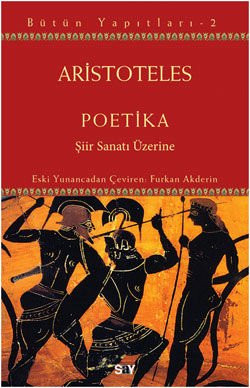
Poetika
Aristoteles, Antikçağ felsefesinin en önde gelen filozofudur. Benzer düzeyde bir felsefeye İlkçağda sadece Platon'un erişebildiği kabul edilir. Antikçağa damgasını vurmuş olan Aristoteles, pek çoklarına göre tüm çağların en büyük birkaç filozofundan birisidir. Bilim ve felsefede onun başarmış olduklarıyla rekabet etme ümidi besleyebilen insan sayısının bir elin parmaklarını geçmediği hemen herkes tarafından kabul edilir.
Aristoteles, mantık, doğabilimleri, metafizik, psikoloji, etik ve siyaset felsefesi gibi pek çok alanda eser vermiştir. "Aristoteles külliyatı" olarak geçen, özgün haliyle Grekçe 1462 sayfadan oluşan eserler bütünü, derslerinin, kendisi ya da öğrencileri tarafından tutulmuş notlarından oluşur.
Sanatı, taklidin taklidi olarak gören ve insanları hakikatten uzaklaştırdığı gerekçesiyle onu neredeyse felsefenin başdüşmanı ilan eden hocası Platon'un aksine, Aristoteles Poetika'sında şiirsel yaratımın doğası ve kaynağı, şiirin tabiat ve hakikatle ilişkisi, sanatın amacı ve işlevi konularını ele alır. Kitap, Platon'un sanata yönelik eleştirel meydan okumasına verilmiş köklü bir yanıt gibidir.
Aristoteles'in en önemli eserlerinden birisi olan Poetika, sadece şiire ve tiyatroya değil bütünüyle sanata ilgi duyan herkes için bir temel eser niteliğindedir.
Sayfa Sayısı: 96
Baskı Yılı: 2011
Dili: Türkçe
Yayınevi: Say Yayınları
İlk Baskı Yılı : 2011
Dil : Türkçe
| Yayınevi | : | Say Yayınları |


